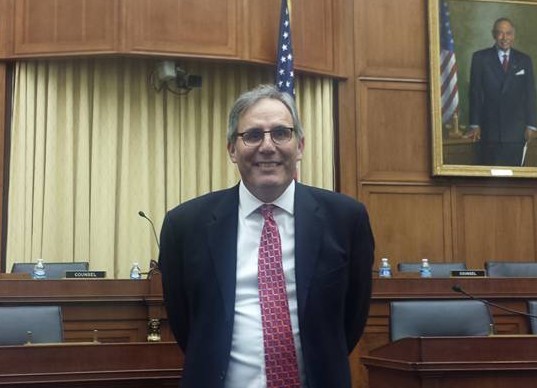Jack Beermann Testifies Before House of Representatives Subcommittee
The Harry Elwood Warren Scholar and Professor of Law offered his expertise on the Chevron Doctrine.

Harry Elwood Warren Scholar and Professor of Law Jack Beermann testified twice this year before the House of Representatives Judiciary Committee’s Subcommittee on Regulatory Reform, Commercial and Antitrust Law.
The two hearings, on March 15 and May 17, addressed the Supreme Court’s Chevron doctrine, which holds that courts should defer to agency interpretations of statutes unless they are unreasonable. The first hearing, chaired by Tom Marino (R-PA), was entitled “The Chevron Doctrine: Constitutional and Statutory Questions in Judicial Deference to Agencies.” The committee heard testimony from a number of legal scholars on the Chevron doctrine and to what extent federal courts should defer to federal agency decisions construing the statutes they administer. Chairman Marino noted in a statement, “the central question in this debate is how much leeway should bureaucrats have in interpreting statutes passed by Congress. […] This hearing will bring greater clarity to the question of what Congress must do to alleviate confusion when it comes to the proper implementation of the law.”
The Chevron doctrine was established by the Supreme Court in a 1984 decision, Chevron USA Inc v. Natural Resources Defense Council. The ruling has had considerable influence in the review of agency decisions of statutory construction. At the first hearing, Beermann argued that the Chevron decision has created a considerable amount of uncertainty in major decisions concerning the distribution of authority among the branches of the federal government and that it has not provided a sound decision framework for review of agency statutory interpretation.
“Chevron is a distraction from what should be the two key issues in judicial review: congressional intent and sensible policy,” he said in his testimony.
Beermann proposed adding language to the 1946 Administrative Procedure Act (APA) to allow judges greater flexibility with regard to agency interpretations of statutes. He envisioned courts applying the pre-APA standard established in the Supreme Court’s 1944 case Skidmore v. Swift & Company, which held that courts ought to determine the weight due an agency’s interpretation through a test based on the four criteria of “consistency, deliberation, thoroughness, and persuasiveness.” Under the Skidmore standard, the reviewing court would decide on all questions of law with regard for the views of the agency administering the statute and any other agency involved in the decision making process.
With the Skidmore standard, according to Beermann, courts would have the flexibility to shape the deference doctrine to meet modern concerns and legal doctrine. The implementation of Skidmore, as he stated, “would head off the extreme deference to agencies that in my opinion often thwart serious examination of congressional intent.”
The second hearing addressed the proposed Separation of Powers Restoration Act of 2016, HR 4768. In his testimony, Beermann critiqued the legislation, calling it “a complete reversal of Chevron and related doctrines.” He suggested the proposed bill “may go too far” in trying to fix the problems created by Chevron, arguing that the bill “would disable reviewing courts from taking into account the views of an administering agency on questions of statutory interpretation and make it difficult for Congress to allow deference to administering agencies when appropriate.”
As a middle ground between Chevron and HR 4768, Beermann reiterated his proposal to return to the Skidmore standard: “While pre-Chevron practice under Skidmore may not have been perfect, by preserving flexibility it would place Congress in charge of the degree to which reviewing courts should defer to agency legal conclusions and would allow Congress to calibrate that deference rather than wipe it out altogether, which would be the case under HR 4768.”
Professor Beermann has taught administrative law for more than thirty years at BU Law and has authored or co-authored four books including a widely used casebook and the Emanuel Law Outline on the subject. Beermann’s first article attacking Chevron, published in 2010, was entitled “End the Failed Chevron Experiment Now: How Chevron Has Failed and Why It Can and Should Be Overruled.” In it, he listed arguments outlining the weaknesses of Chevron and its role in recent court decisions.
In a more recent article, “Chevron at the Roberts Court: Still Failing After All These Years,” he examined Chevron deference and the voting records of current Supreme Court Justices under the decision. Observing that the Roberts Court has not succeeded in making Chevron a workable doctrine, Beermann concluded, “For many reasons, the Chevron doctrine is a failure that should be jettisoned at the earliest possible time.”
Reported by Greg Yang (CAS’17) and Trevor Persaud (STH’18).